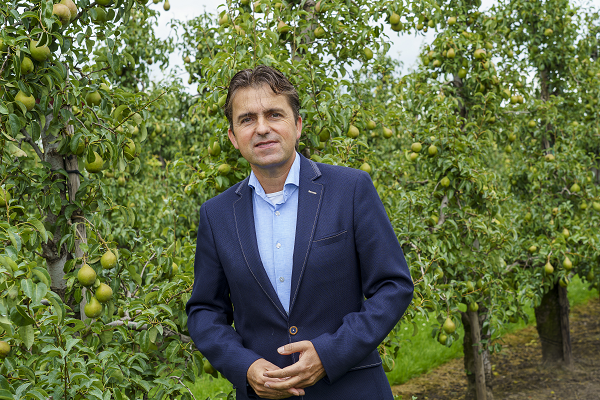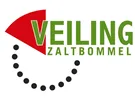In early 2022, Gerard van den Anker took over directorship of the Dutch cooperative, Veiling Zaltbommel. He refers to these early days as draining. "It seemed the world had gone crazy, with new dilemmas rapidly emerging. It's was a very dynamic time," he begins.
Gerard gained experience and a network from his political and administrative career. "My political experience and representing interests combine wonderfully in this position at Veiling Zaltbommel." He also cultivates pears himself. "So I'm well aware of what goes into growing a good product and what efforts you need to make to achieve that," says Gerard.

"I, too, experience the weather extremes. It's fantastic to be close to the growers." He wants Veiling Zaltbommel to grow with the market. He passionately refers to the lack of appreciation for growers and the need to close the gap between cultivation and consumption. Gerard shares his vision for, among other things, the importance of price transparency, the challenges facing cultivation, and the need to preserve fruit and vegetable farming in the Netherlands with Primeur.
There is a growing trend toward retailers being directly supplied. How do you see your cooperative's role in this?
"Most importantly, to prevent fragmentation. But showing what you're doing and what needs to be done in cultivation is vital too. If you invite parties to see what cultivation is all about, they have a greater appreciation for everything growers have to do to get products on store shelves. That awareness is critical for both consumers and retailers. The top and soft fruit and 'Visit the Greenhouse' days, for example, play a role. There's too big a gap between consumers and cultivation. It's wonderful to bridge and reduce that to the point where when people go shopping, they deliberately choose to buy local products rather than those from far away."
Scaling up plays a role in the food chain. Is that something Veiling Zaltbommel does by adding growers, takeovers, or partnerships?
"It's essential to keep growing in the market. We're big in particularly soft fruit: strawberries, raspberries, and redcurrants. That market is expanding, as are our customers, which means the cultivation side can and should too. When you grow, you must ensure sufficient bilateral growth - both in cultivation and on the buyer's side. If you balance that, it will go well. Also, we're uniquely located in the Netherlands, near a major highway in the middle of the country. All logistics service providers use that route, so we're very central. That offers additional opportunities for supply as well as transport. Thus, we're attractively located for growers too."
"Veiling Zaltbommel is a cooperative of, and for, growers, with no own trading position. That's what differentiates us. We're a small organization with short lines that knows its growers and buyers. We enjoy going that extra mile. Our story appears to be catching on; we've recently gotten new members and buyers, thanks to our, most important, credo: quality. We have short lead times too; with us, fresh really is fresh. Plus, we're very flexible. Much is possible at Zaltbommel, and that's leading to a nice increase in new members and buyers. We know how to position Veiling Zaltbommel well in the market, and we emanate that."
You are planning a digital auction. Why are auctions still important?
"We love sharing what we're doing, one of which is price transparency. We consider auctioning a crucial tool and a great asset. At auction, you establish prices very transparently. We want to be distinctive with that because we think growers have a right to transparent prices. Our growers like that prices aren't established in a 'black box'; they're simply open for all to see. That's how it should be and that's what we stand for. Veiling Zaltbommel auctions per lot, with no block formations. Growers can build a name for themselves with buyers and, thus, earn something extra at market if they have a good product and reputation. With block auctioning, growers compete with the average, and extra effort and quality often aren't greatly rewarded. Our buyers and our growers appreciate the way we do things."
"That, naturally, means we're going to invest in that element. We're going to digitize the auction to also become even more interesting for both growers and buyers. It's a kind of open marketplace for growers and buyers who place value on quality products. Plus, it opens the way for more foreign suppliers and buyers. That's real growth."
"A digital auction will promote price transparency; something we find paramount. Growers get to see what prices their products make without any margins. So the price their wares get at auction is what they get. We don't take a trading position and add no margins. As befits a cooperative, we try to get the highest possible price for our growers at the lowest possible cost. So growers get paid one-to-one; something, I hear, that's not the case everywhere."
Do you consider the auction a factor in market power against retailers too?
"Yes, I think so. An auction is a fair tool. There's always a question of what the price will do. Particularly when, at the start of the season, large volumes come onto the market for the first time. You can base pricing on historical data or overseas prices. For example, what will the first large lot of Dutch raspberries go for? The clock starts running, and pressure is on; and, in that moment, the market price of Dutch raspberries is determined. That cannot be established more fairly than at auction, and those prices are also passed directly into the market. It's the true price measure. How else would that happen? What would your starting point be?"
Consumers, like growers, face steep inflation and must make spending choices. Belts are being tightened. What will that mean for fresh fruit sales?
"There are plenty of opportunities for fresh produce, including fruit. The corona pandemic made people more aware that eating responsibly is still an important foundation for health. That undoubtedly provides market prospects. Everything has become more expensive while there's more than enough room for better margin distribution in the chain. After all, fair prices are the whole chain's responsibility."
What do you expect from the organic category?
"That category is growing very slowly, and consumers aren't yet entirely sold on it. Organic prices are much higher, after all. Growers are the ones risking everything at present because they're counting on a target percentage for organic, but you cannot force the market. Goals are often expressed in percentages, with no impact analysis or research into whether consumers are actually willing to pay more for a product. With PlanetProof, for example, that surcharge still isn't being reached, despite all the sustainability goals that are being imposed, including demands that surpass legal requirements. Apparently, neither the retail sector, consumers, nor, especially, overseas countries - the export sector - aren't prepared to pay that premium. Incidentally, Veiling Zaltbommel growers are free to choose which certification they want to get."
Energy prices are currently volatile and high; how will that affect the greenhouse cultivation of, say, strawberries?
"That's what each and every grower is wondering: how will my cultivation plan look? And how am I going to do that as energy-efficiently as I can? Energy costs have never been as great a concern as they are at present. Planting was done automatically for years. Now growers are trying to find ways to bolster their crops with as little energy as possible. That's different for each grower, which is quite nerve-wracking. It's new territory because no one knows what the gas price will be next week or next month. Nothing is sure. How harsh will the winter be? How will the geopolitical situation develop? There are so many questions; I don't think cultivation has even been this uncertain."
"Many growers are doing the sums and wrestling with dilemmas about product yields at current gas prices. And that in addition to all the other cost increases. It's not just energy, but there are things like inflation, fertilization, labor, and other costs such as parts. All the cost price increase knobs are being turned at once. It's very tough to make the right decisions in greenhouse cultivation. Veiling Zaltbommel has our ear to the ground and keeps in close contact with our growers. That's beneficial because we have to adjust our sales strategy too. Short lines of communication are a big advantage here. We can, thus, respond to the market and know very clearly when to expect what."
What is that doing to growers' earnings models and fruit and vegetable consumer prices?
"Better margin distribution in the chain offers growers better chances to keep up with cost increases than they currently have. The Dutch Agricultural and Horticultural Organization has, for instance, set up the 'Earning in Chains' project. It brings the entire chain and various farmer organizations, Rabobank, and all the supermarket chains together to reach agreements. I hope that bears fruit and raises awareness. It's never been more needed than now. Here, too, price transparency is a great thing. We need to eliminate the pricing 'black box' a bit. We rely on each other, after all."
"That's also the beauty of a cooperative such as ours: it helps prevent fragmentation. We genuinely need to do it together. I believe that working together can truly benefit individual growers. Growers, the auction, retailers, the market, and food service all need each other. It's good if everyone can earn a living. That makes each link viable and guarantees everyone's earning model. If there are sustainability goals and above-legal requirements around biodiversity, that must be of value too. Everyone supports biodiversity, but it seems no one wants to pay for it. That's crazy. Growers can play an important role - in the food supply and as landscapers - to strengthen biodiversity."
 Veiling Zaltbommel
Veiling Zaltbommel
+31 (0)418 579911
www.veiling-zaltbommel.nl
info@veiling-zaltbommel.nl
